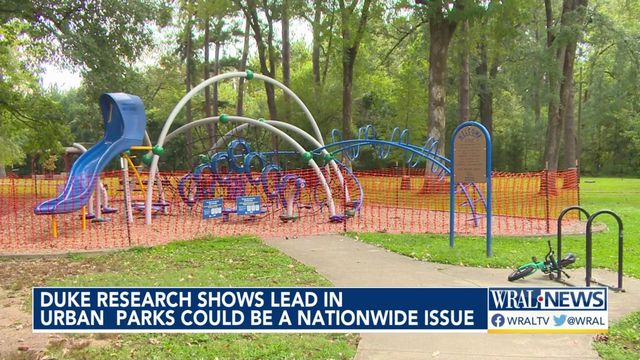Duke researcher finds lead in parks issue not exclusive to Durham
Parts of parks in Durham are still closed after Duke researchers discovered lead in 2022.
WRAL Investigates dug into how long the city knew about the issue. Emails showed Parks and Recreation employees put off the professor's concerns for months.
A Duke professor has recently released research about where the lead came from.
The issue of lead in the soil of urban areas may not just be a problem for Durham. Three of the five parks are located on old waste incinerator sites. A fourth was near a waste incinerator site and a fifth had ash brought from a site for infill.
Professor Dan Richter with the Duke Nicholas School of the Environment said this issue is seen in many cities.
"This is a story of perhaps half the cities in the United States and Canada that burned city waste for decades, many of which are unaware at this moment in our estimation, of what those places became," Richter said.
Richter said he hopes soil mapping around the country will be funded, since the lead in the ash from these incinerator sites poses a risk to human and environmental health.
In Durham, the contaminated areas are still fenced off. The city says it's working with the state on the issue.
Lead levels in eight samples in an east Durham park measured greater than the EPA threshold.
Orange fencing blocks off parts of parks around Durham. The restricted access is a recent development, but the issue goes back decades.
It started for Richter when he noticed an overlap of old city incinerator sites and contemporary Durham parks on a 1937 map.
"As a soil chemist that really got my interest," Richter said.
Gathering data from digitized newspapers, Duke's original testing looked at East End, East Durham, and Walltown Parks. The city's third party testing company added Lyon and Northgate Parks to their testing list.
"Five hundred truckloads of ash were transferred from Walltown up to Northgate Park to fill in low-lying areas," Ritcher said.
Richter says this is not just a Durham problem. City waste ash was improperly disposed of around the country, disregarding the impact on human and environmental health.
"It was dumped in harbors," Ritcher said. "It was dumped in gullies. In California in the 1940s, they were filling up canyons. Doing things that we would never think of doing today."
With better technology, access to historical records, and a new focus on city soil maps, Richter hopes other cities will start cleaning up their parks as well.
"We can track down these city park problems and city soil problems in a way that we wouldn't have been able to, maybe a decade ago," Ritcher said.
As for next steps in Durham, the city says findings have been submitted to the state, and access to contaminated areas will still be restricted.











